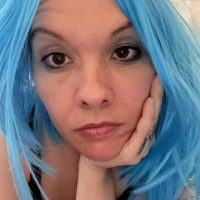Six years ago, I was diagnosed with epilepsy following an intracranial hemorrhage and brain surgery when I was 34 years old.
I had partial seizures immediately after surgery, which blossomed into the notorious grand mal seizure (technically referred to as the Tonic-Clonic seizure.)
After six years of navigating the world of epilepsy, which includes both the suddenly mysterious inner landscape of my mind and body as well as the intimidating labyrinth of medical institutions, pharmaceuticals, and seemingly endless archives that seem to reveal little new information, I’ve concluded that I’ve always had focal awareness seizures as well as other early warning signs that something wicked this way was coming, such as tremors, auras, and mood swings.
That being said, I didn’t grow up “epileptic” as far as anyone knew.
I had shame regarding generational trauma and poverty, and my childhood was far from idyllic, but I didn’t have the added vulnerability of having a physical disability or of being a child going through the stages of grief I now go through time and again regarding my physical limitations.
I wasn’t not invited places because of epilepsy. I didn’t have the sense of being in the way or holding anyone back. I could ride my bike down the steepest hills, jump in rivers, and go on after-dark Easter egg hunts with flashlights. Moreover, nobody looked at or treated me like I was fundamentally different, embodying their unconscious fears in stereotypical images of exorcisms gone awry or wearing helmets to the dinner table conspicuously “othered.”
~
Best way to to keep your core pelvic and org@sm muscles strong and resilient? Here’s the coveted apparatus that makes this possible >>
~
I had many years of “hot girl summers” and being invited to purchase red plastic cups to fill up at kegs. I did my 90s charcoal eyeliner in the full-length mirror with a steady hand, drank syrupy sweet lattes, and chain smoked in 24-hour diners just like everyone else in Seattle at the time.
Never mind.
I had tunnel vision and couldn’t see beyond, well…me.
But not in a navel-gazing way, not that my navel would’ve been hard to see in those days—I was all ribs. I was only looking as far as the high beams showed me, and what was beyond was nihilistic nothingness. Today and now was a Sailor Jerry tattoo or a monologue memorized from “The Story of O.”
Having kids did level me, quite a bit, as clipping coupons with engorged breasts tends to do, but my worldview was narrow and persistent: Survive, at all costs. And with as much effortless style as possible.
One day, to the best of my complete knowledge of the entire world and my existence within it, I didn’t have epilepsy at all—never would.
Until, one day, I did.
How does one just “come down” with epilepsy? And what is epilepsy?
In my uninformed mind it was, or at least sounded like, multiple sclerosis and Parkinson’s. Vague mental associations of wheelchairs, hospital beds, and loved ones I faintly remember becoming faint with cancer or AIDS. Epilepsy was kinda like that but with a hint of leprosy tossed in. And in spite of feeling like a quintessential leper with any number of chronic illness symptoms sometimes, that’s not what it is.
My treatment consists of taking medication. I used to be ethically and vocally opposed to pharmaceuticals until I didn’t have a choice if I wanted to live. My treatment also consists of CBD, omega, yoga, hiking, a keto diet, a consistent sleep schedule, an emotional support animal, hydration, supplements, trauma therapy, reiki, and an entire articles-worth of traditional and alternative medicine.
But what it also consists of is healing in the most terrifying and organic way possible:
Listening to my body.
The same body that was numb and disassociated with trauma, stimulants, and toxic relationships for decades. I can’t afford to play Russian Roulette with my body anymore, my friends; I fear there are too many bullets left in the gun.
Epilepsy has turned me soft like clay, and fighting to find my edges just so I can play with them isn’t productive for me anymore. I cry when I’m in the same dry, hardened places I grew up in, maybe anointing the earth with its first rainfall in years. These tears may be the visceral release that saves me from expelling my personal demons through violent convulsions on the floor. I was a winter creature who stayed inside reading, curtains drawn spring through summer. But no more—slathered with sunscreen, I walk my dog or accompany a friend to the Tulip Fields or Waterfront. Because the sun has vitamin D.
Lipids and electrolytes, antioxidants and probiotics have become my lingo. The limbic, lymphatic, and central nervous have become the systems with which I am most familiar. I understand there are things I can do to lower or raise my seizure threshold and learned how to admit if I’m pushing myself a little too hard, even though pushing myself a lot too hard was part of my identity for a long time.
Most importantly, maybe, are the things I notice that wouldn’t have been a blip on my radar before my diagnosis, subsequent suffering, and hard-won recoveries.
Someone mentions they or someone they love has cancer or AIDS or Parkinson’s or multiple sclerosis and my heart and ears open. I know only that I don’t know, just like nobody can truly understand epilepsy unless they have it. But I know that I want to know more. I have time to listen and time to share about how people manage chronic health conditions, what they choose to sacrifice or hold on to, how they weigh the risks versus rewards, how everything changed all at once or was gradual, how people react to them, and what keeps them going in those moments of mysterious fear or pain.
Time itself has become a precious commodity, experienced differently out of necessity, measured in the moments between seizures or bouts of pain; instead of moving in the linear direction of aging, we grow or decline in terms of progress, remission, seizure control, pain management, asymptomatic, regression, and flare-ups.
I experience the world as inescapably human now.
Always painfully aware of my limits as well as the potential of my glorious mortality.
~
Ready to join?
Hey, thanks so much for reading! Elephant offers 1 article every month for free.
If you want more, grab a subscription for unlimited reads for $5/year (normally, it's $108/year, and the discount ends soon).
And clearly you appreciate mindfulness with a sense of humor and integrity! Why not join the Elephant community, become an Elephriend?
Your investment will help Elephant Journal invest in our editors and writers who promote your values to create the change you want to see in your world!
Already have an account? Log in.

 Share on bsky
Share on bsky







Read 2 comments and reply